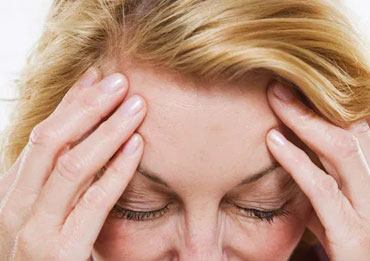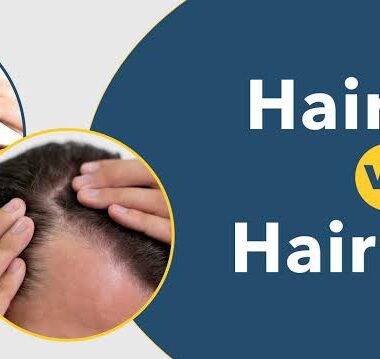Menopause and Hair Loss
Menopause is a natural biological process that all women experience at some point in their lives. During this time, the body goes through numerous physical changes as it adjusts to fluctuating hormone levels. Many women have unpleasant symptoms during menopause, including hot flashes, mood swings, and insomnia. Hair loss is another common occurrence.
Hair loss tends to be subtler in women than it is in men. Most women experience overall hair thinning rather than noticeable bald spots. The thinning can occur on the front, sides, or top of the head. Hair may also fall out in large clumps during brushing and showering.
Research suggests that hair loss during menopause is the result of a hormonal imbalance. Specifically, it’s related to a lowered production of estrogen and progesterone.
These hormones help hair grow faster and stay on the head for longer periods of time. When the levels of estrogen and progesterone drop, hair grows more slowly and becomes much thinner.
A decrease in these hormones also triggers an increase in the production of androgens or a group of male hormones. Androgens shrink hair follicles, resulting in hair loss on the head.
In some cases, however, these hormones can cause more hair to grow on the face. This is why some menopausal women develop facial “peach fuzz” and small sprouts of hair on the chin.
There are many other factors that can contribute to hair loss during menopause. These include extremely high levels of stress, illness, or a lack of certain nutrients. Diagnostic blood tests that can help rule out other causes of hair loss include thyroid tests, and/or a complete blood count.
Hair loss may make you feel self-conscious about your physical appearance, but the condition isn’t permanent. There are also steps you can take to treat hair loss and improve the quality of your hair. Follow these tips to keep your locks healthy and strong during menopause.
Reduce Stress
It’s important to keep your stress levels in check to prevent a hormonal imbalance. Reduced estrogen production can affect your brain chemistry and cause mood swings, anxiety, and depression. However, doing yoga and other breathing relaxation methods is especially effective in fighting menopausal symptoms. Exercising regularly can also help reduce stress.
Get Moving
Exercise is a key component of a healthy lifestyle. You’ll feel stronger and happier once you incorporate exercise into your daily routine. It also helps prevent some of the other symptoms of menopause, including mood swings, weight gain, and insomnia. All of these factors are important for maintaining hormonal balance, which promotes healthy hair growth.
Eat Well
Eating a balanced, low-fat diet is your best defense against hair loss. Make sure you include an adequate amount of whole grains, fruits, and vegetables in every meal. It’s also important to incorporate mono-saturated oils, such as olive oil and sesame oil, into your diet. Drinking green tea and taking vitamin B6 and folic acid supplements may help restore hair growth as well. Essential fatty acids also play a crucial role in maintaining hair health. These fatty acids can be found in the following foods:
- salmon
- tuna
- flaxseed oil
- walnuts
- almonds
Hydrate
Your body needs to be hydrated in order to function properly. Load up on H2O all day long and pass on juices, sodas, and other flavoured drinks that contain more sugar than your body needs. The amount of water needed varies from person to person and depends on various factors, including overall health and exercise intensity.
Keep It Natural
In order to prevent drying and breakage, it’s best to stay away from heat tools, such as hair dryers and straightening irons. Extensions and other styling methods can also weaken your hair and cause early hair loss. If you must dye your hair, choose an all-natural hair colour.
Artificial chemicals found in dyes and perms can compromise your scalp and hair health. When you wash your hair, always use a nourishing conditioner to keep your scalp healthy and promote healthy hair growth.
Talk to Your Doctor About Your Medications
Some medications have side effects that include hair loss. Talk to your doctor if you are experiencing significant hair loss and you think that your medication might be the cause. Your doctor might be able to switch you over to another type of medicine without any reported side effects. Don’t stop taking your medications until you’ve spoken with your doctor, as this could be dangerous for your health.
Other Treatments that may help
If you are suffering from severe hair loss or thinning, then it’s important to find out what’s causing it at the earliest stage.
Studies have indicated that a proper diet and exercise may naturally treat stress-related hair fall. However, this can take years and a natural non-surgical procedure such as PRP may well be the answer to help restore hair loss.
Was is PRP and How does it work?
After an initial consultation with our hair specialist, you can expect to be booked into the diary of the professionally trained nurse, the nurse will take a blood sample from the arm much like a routine blood test. The Blood is then spun in a special machine called a centrifuge for 10 minutes. Following the spin will then produce the PRP which is a concentration of the self-healing platelets in abundance amongst the normal blood plasma.
The target area for treatment is then cleansed, and an anesthetic cream may be applied to reduce discomfort (client dependant). The extraction is then injected into the scalp at multiple locations to help treat the areas of hair loss.
The whole process takes roughly 25 – 35 mins. The best results are obtained by taking a course of 3-4 injections repeating the procedure each month and then a follow-up “maintenance” injection is advised twice yearly henceforth.
The Regrow Hair Centre offers treatments to suit your individual needs. Call us today to book a free consultation with our hair specialist who will not only be able to help you identify the cause of your hair loss but also place you on a personalised hair plan outlining the best treatments that will be most effective for your hair loss.
HR23+ Vitamins
Some studies suggest that biotin or vitamin H could be useful in treating hair loss. Biotin is used to build hair, skin, and nails and the study says that if combined with zinc, it can help lower DHT.
Regrow Hair Centre uses HR23+ as its main supplier of vitamins designed to regrow hair which includes all of the vital ingredients like Biotin, Vitamin C, and Saw Palmento – in fact, HR23+ uses 23 key ingredients designed to help with your hair loss, 90% of users noticed visible results.
Written by Khuram Abbas Raja for The Regrow Hair Centre






